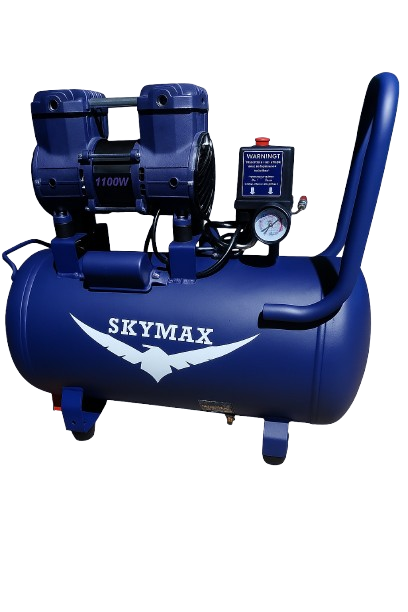
How to Choose the Right Air Compressor – Skymax Buyer’s Guide
Share
Selecting the right air compressor is crucial for efficiency, safety, and cost-effectiveness. Whether you’re running a workshop, dental clinic, or industrial unit, the wrong choice can lead to downtime, higher maintenance, or poor performance. This guide will help you make an informed decision.
1. Identify Your Air Compressor Needs
Before buying, define the purpose:
-
DIY & Light-Duty Use: Inflating tires, powering small air tools, painting.
-
Professional & Industrial Use: Spray painting, production line tools, packaging.
-
Sensitive Environments: Medical, dental, electronics, and food industries require oil-free compressors to avoid contamination.
2. Understand Different Air Compressor Types
Oil-Free vs Oil-Lubricated Air Compressors
-
Oil-Free Compressors: Clean, low maintenance, and quieter. Ideal for intermittent use and sensitive environments. Example: Skymax Oil-free 30L Air Compressor.
-
Oil-Lubricated Compressors: More durable for continuous, heavy-duty industrial use but require regular oil changes.
Single-Stage vs Two-Stage Compressors
-
Single-Stage: Compresses air in one step; best for home and small workshops.
-
Two-Stage: Compresses air in two stages; provides higher pressure for industrial applications.
Portable vs Stationary Compressors
-
Portable: Compact, easy to move, best for intermittent tasks.
-
Stationary: Installed in a fixed location, suitable for factories and heavy-duty applications.
3. Key Specifications to Check
-
Tank Size (Liters/Gallons): Larger tanks store more air, reducing on/off cycles.
-
CFM (Cubic Feet per Minute): Ensures your compressor meets the airflow requirements of your tools.
-
PSI (Pounds per Square Inch): Matches the pressure requirements of your equipment.
-
Duty Cycle: Determines how long the compressor can run continuously without overheating.
4. Consider Noise Levels
If your workspace is indoors or requires a quiet environment, noise matters. Oil-free compressors are typically quieter than oil-lubricated ones, making them ideal for clinics, labs, or small workshops.
5. Maintenance & Durability
-
Oil-Free: Minimal maintenance, no oil changes, fewer parts to worry about. Perfect for intermittent use.
-
Oil-Lubricated: Handles continuous use but requires regular oil changes and upkeep.
6. Budget vs Long-Term Value
While oil-free compressors may cost more upfront, they save on maintenance and downtime. Oil-lubricated compressors may be more cost-effective for continuous industrial use.
7. Practical Tips for Choosing the Right Air Compressor
-
List all tools and equipment you’ll use.
-
Calculate total CFM needed.
-
Ensure PSI matches tool requirements.
-
Decide between portability or stationary installation.
-
Factor in noise restrictions and maintenance preferences.
-
Choose a trusted brand like Skymax for reliability and after-sales support.
✅ Conclusion
Choosing the right air compressor depends on your tools, usage patterns, and workspace. For intermittent use, sensitive applications, and quiet operation, oil-free models like the Skymax 30L are ideal. For heavy-duty continuous operation, oil-lubricated or two-stage compressors are better suited. Make an informed choice to ensure efficiency, durability, and safety in your workspace.
